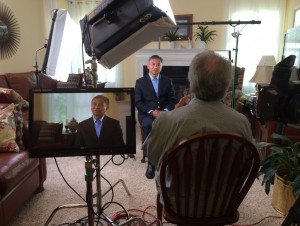WASHINGTON, DC—A new documentary showing the traditions and challenges of family caregiving in the Filipino American community through the eyes of three individuals has been released “to help families start an often difficult but vital conversation about caregiving,” AARP, the organization for retired persons, announced.
The ten-minute documentary featuring three people with “unique caregiving stories” premiered last week for members of the Asian American and Pacific Islander community in Southern California, at AARP’s Ideas@50+ National Event & Expo at the San Diego Convention Center.
“We produced ‘Caregiving Dahil Mahal Kita (Because I Love You)’ to help families start the difficult conversations around caregiving for their loved ones,” said Daphne Kwok, AARP vice president of Multicultural Markets and Engagement, Asian American and Pacific Islander Audience.
“The documentary is a starting point for candid discussions about the needs of our family members, the importance of pre-planning and solutions available, and how to cope with day-to-day decisions required to care for a loved one at home, whether they live nearby or far away,” Kwok explained.

AARP Community Ambassador retired Maj. Gen. Tony Taguba during the filming of AARP’s documentary “Caregiving Dahil Mahal Kita (Because I Love You).” CONTRIBUTED PHOTO
Narrated by Filipino American journalist Lloyd LaCuesta, “Caregiving Dahil Mahal Kita (Because I Love You)” features three firsthand accounts of family caregiving:
- Retired Maj. Gen. Tony Taguba’s father escaped the Bataan death march in 1942 and joined the Filipino resistance against Japanese occupiers in WWII. Long after his father’s military career ended, the war hero suffered from dementia, and Gen. Taguba’s family relationships were tested when the parent/child roles were reversed.
- Dolores Velasco, a former nun, became a caregiver to her husband Pete Velasco. As a young man, Pete was one of the thousands of Filipino workers who walked off the grape farms of Delano, California, during the 1965 harvest season. When Mexican workers began crossing the picket lines, Pete and other Filipino organizers persuaded Cesar Chavez to join what would become the United Farm Workers (UFW). The Delano grape strike is often associated with Chavez and Mexican workers, but it was started by Filipinos, and Peter Velasco was a major leader in the movement. After Pete was diagnosed with cancer, Dolores devoted herself to his every need.
- Leo Duran is separated by eight thousand miles between his home in the United States and his family in the Philippines. Although he works two jobs and uses technology to stay in contact, Leo still feels frustration and guilt while caring for his mother an ocean away.
According to AARP Research, Asian American and Pacific Islanders (AAPI) provide caregiving for their families more than any other ethnic group:
- 73 percent of AAPIs feel that adult children should care for their elderly parents, compared to 49 percent of other Americans
- 72 percent of AAPIs express guilt for not providing more care, compared to 48 percent of other Americans
- 42 percent of AAPIs are more likely to care for a parent or older relative, compared with 22 percent of the general population
- 33 percent of AAPIs age 45 to 55 expect their children to care for them, compared to 22 percent of the total 45 to 55 population
- 17 percent of AAPI households are multigenerational, compared to 7 percent of other Americans.
“Caregiving Dahil Mahal Kita (Because I Love You)” was directed by Stephen Menick, who also directed AARP’s “Honorable Journey,” about the 70-year struggle of Japanese Americans who came of age during World War II.
To watch “Caregiving Dahil Mahal Kita (Because I Love You)” and learn about how AARP helps Asian American & Pacific Islander families, visit www.AARP.org/AAPI.